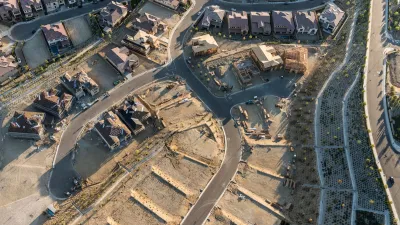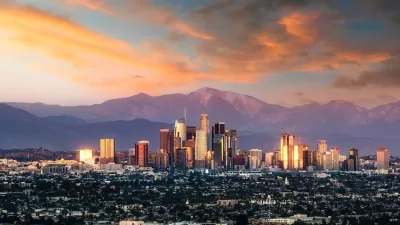The second and third parts in resiliency expert Dave Hampton's 3-part series on what the California fires teach us about preparing for climate change.

In this three part series, resiliency expert Dave Hampton examines the recent California fires for lessons on preparing for the increasing number of disasters anticipated in connection with a warming global climate. In the first part, also summarized in Planetizen, Hampton discussed the difference between "attribution" and "contribution" when discussing the role of climate change in natural disasters.
In the second part, Hampton notes that use of the term "wildfires" is distracting. The "wildland-urban interface" (or WUI) must be the focus of preparation and prevention efforts. WUI “refers to the zone of transition between unoccupied land and human development. Communities that are within 0.5 miles (0.80 km) of the zone may also be included.” (Citing Radeloff et al. (2005))
In the third part, Hampton discusses key concepts from the International Wildland-Urban Interface Code (IWUIC). He then goes on to discuss some recent failures due, in part, to outdated models and maps, and the need to be proactive in developing new fire and flood maps and codes. For more details, read the source article.
FULL STORY: Lessons from the California Fires: Climate Change Impacts and Proactive Planning (part 3)

Manufactured Crisis: Losing the Nation’s Largest Source of Unsubsidized Affordable Housing
Manufactured housing communities have long been an affordable housing option for millions of people living in the U.S., but that affordability is disappearing rapidly. How did we get here?

Americans May Be Stuck — But Why?
Americans are moving a lot less than they once did, and that is a problem. While Yoni Applebaum, in his highly-publicized article Stuck, gets the reasons badly wrong, it's still important to ask: why are we moving so much less than before?

Research Shows More Roads = More Driving
A national study shows, once again, that increasing road supply induces additional vehicle travel, particularly over the long run.

Judge Halts Enforcement of Anti-Homeless Laws in Grants Pass
The Oregon city will be barred from enforcing two ordinances that prosecute unhoused residents until it increases capacity and accessibility at designated camping sites.

Advancing Sustainability in Los Angeles County Schools
The Los Angeles County Office of Education’s Green Schools Symposium brings together educators, students, and experts to advance sustainability in schools through innovative design, climate resilience strategies, and collaborative learning.

Using Old Oil and Gas Wells for Green Energy Storage
Penn State researchers have found that repurposing abandoned oil and gas wells for geothermal-assisted compressed-air energy storage can boost efficiency, reduce environmental risks, and support clean energy and job transitions.
Urban Design for Planners 1: Software Tools
This six-course series explores essential urban design concepts using open source software and equips planners with the tools they need to participate fully in the urban design process.
Planning for Universal Design
Learn the tools for implementing Universal Design in planning regulations.
City of Moreno Valley
Institute for Housing and Urban Development Studies (IHS)
City of Grandview
Harvard GSD Executive Education
NYU Wagner Graduate School of Public Service
City of Cambridge, Maryland
Newport County Development Council: Connect Greater Newport





























